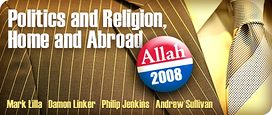Where I disagree with Damon is in his basic concept of “Theo-conservatism.” It’s a lovely term, but what does it really mean? I am surprised to see someone like Rushdoony cited as the representative of anything. Despite the claims of his disciples, the man was a marginal flake whose Reconstructionist ideology had no influence I have ever been able to trace on any serious political cause or movement. (His influence on the early phases of home-schooling was more palpable). Just look at the sales figures on his books. Since I don’t accept the existence of theo-conservatism as a significant force, or a real movement, I’m not sure how useful it is to analyze “the theo-conservative approach to religion” or “the theocon program.” Does Theo-conservatism exist — has it ever existed — except as a pejorative term for religious activism with which one does not sympathize?
I would also repeat that historically, political theology/religious politics are as likely to be found on the left as the right.
Where I thoroughly agree with all the other participants in this debate is in celebrating the success of American constitutionalism and pluralism in creating the extraordinarily healthy and indeed booming state of the nation’s religious organizations today. I very much hope that as Islam comes of age in the American environment, that it will share in this boom, and that American Muslims will export some of their insights back to the Islamic heartland.

